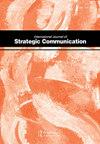How Multiple Identities Can Impact the Legitimacy of an Organization
IF 2.3
Q1 COMMUNICATION
International Journal of Strategic Communication
Pub Date : 2022-08-08
DOI:10.1080/1553118X.2022.2070754
引用次数: 0
Abstract
ABSTRACT Organizations realize that their license to operate and the supportive behavior of their stakeholders relate to how they come across. If the identity of an organization is not a single, but multiple it may face unique challenges in strategic communication. The purpose of this study is to identify how the reputation and legitimacy of such a multiple identity organization (MIO) are affected by its performance and communications. Building on organizational identity theory, insights from corporate communication, and stakeholder theory, the potential vulnerabilities are listed through theoretical deduction and are illustrated by the case of Sanquin, the Dutch blood supply foundation. The case assessment relies on interviews with stakeholders and journalists, complemented with an analysis of newspaper headlines. The mismatch between the identities endangers legitimacy because legitimacy is based on the conformity to norms and values, the area where the identities clash. The inherent tension between the ideological and utilitarian identity cannot be avoided completely, but a strategic communication policy that manages the balance between the identities in organizational communication could help a better understanding of MIOs. The case offers insights into how creating this balance might be considered in the development of strategic communication of MIOs.多重身份如何影响组织的合法性
组织意识到,他们的经营许可和利益相关者的支持行为与他们的遭遇有关。如果一个组织的身份不是单一的,而是多重的,那么它可能在战略沟通中面临独特的挑战。本研究的目的是确定这种多重身份组织(MIO)的声誉和合法性如何受到其绩效和沟通的影响。在组织认同理论、企业沟通见解和利益相关者理论的基础上,通过理论推导列出了潜在的漏洞,并以荷兰血液供应基金会Sanquin为例进行了说明。案例评估依赖于对利益相关者和记者的采访,并辅以对报纸标题的分析。身份之间的不匹配危及合法性,因为合法性是基于对规范和价值观的遵从,这是身份冲突的领域。意识形态认同和功利主义认同之间的内在张力是无法完全避免的,但在组织沟通中管理好这两种认同之间的平衡的战略沟通政策可以帮助我们更好地理解mio。该案例提供了如何在mio战略沟通的发展中考虑创造这种平衡的见解。
本文章由计算机程序翻译,如有差异,请以英文原文为准。
求助全文
约1分钟内获得全文
求助全文
来源期刊

International Journal of Strategic Communication
Social Sciences-Sociology and Political Science
CiteScore
3.40
自引率
0.00%
发文量
39
期刊介绍:
The International Journal of Strategic Communication examines the philosophical, theoretical, and applied nature of strategic communication, which is “the purposeful use of communication by an organization to fulfill its mission.” IJSC provides a foundation for the study of strategic communication from diverse disciplines, including corporate and managerial communication, organizational communication, public relations, marketing communication, advertising, political and health communication, social marketing, international relations, public diplomacy, and other specialized communication areas. The IJSC is the singular forum for multidisciplinary inquiry of this nature.
 求助内容:
求助内容: 应助结果提醒方式:
应助结果提醒方式:


